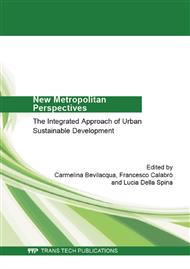p.386
p.392
p.402
p.410
p.417
p.424
p.433
p.443
p.447
Development of the Environmental, Social and Economic Sustainability in the Peri-Urban Agricultural Areas: Governance Opportunities in the South Milan Agricultural Park
Abstract:
Farms located in economically advanced areas in close contact with large cities, industrial areas and major infrastructure, may be subjected to the pressure of negative externalities beyond the agricultural sector. This work is based on the study of the interactions between the metropolitan area of Milan and the agricultural activities around it. We decided to assess the 3 scales of sustainability (environmental, social, economic) of farms to create a means to guide the local institution (the Parco Agricolo Sud Milano, PASM) towards innovative and sustainable solutions. The survey was carried out through a tool that compares farms through indicators, integrating agricultural production with environmental protection. It assesses the strengths and weaknesses of the production system and the ways to improve the level of sustainability. We sampled farms and collected their data (from database, interviews, estimates, observations, tabulated data). The results highlight that what had been done so far by the PASM has provided valid economic tools for large multifunctional farms which network is deeply tied to the local contest, through services such as direct sales, the short chain, agritourism and related activities. This has certainly contributed to the improvement of environmental conditions and landscape of the area, which the population of Milan has often shown appreciation. On the other hand, large and small specialized farms, not characterized by these sources of income, have not received equal contribution.
Info:
Periodical:
Pages:
417-423
DOI:
Citation:
Online since:
June 2014
Authors:
Permissions:
Share:
Citation:


